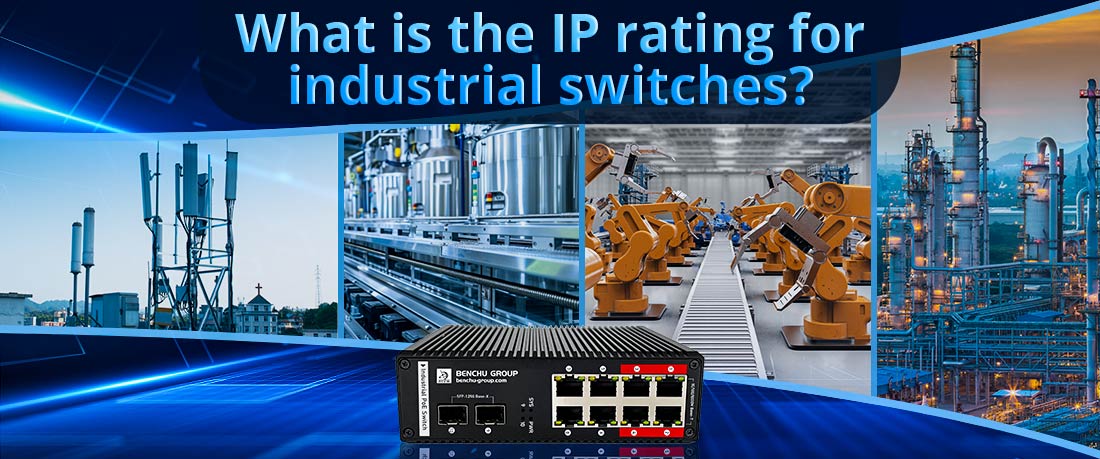
The IP rating (Ingress Protection rating) is a crucial standard used to define the level of protection provided by enclosures for electronic devices, including industrial switches. This rating specifies the degree to which the switch is protected against solid particles (like dust) and liquids (such as water), making it an essential consideration for deployment in various industrial environments. Here's a detailed description of IP ratings for industrial switches:
1. Understanding IP Ratings
Structure of IP Ratings
The IP rating consists of two digits following the letters "IP." For example, an IP rating of IP67 indicates:
--- First Digit: Protection against solid particles (ranging from 0 to 6).
--- Second Digit: Protection against liquids (ranging from 0 to 9).
2. First Digit: Protection Against Solid Objects
0: No protection.
1: Protection against solid objects larger than 50 mm (like hands).
2: Protection against solid objects larger than 12.5 mm (like fingers).
3: Protection against solid objects larger than 2.5 mm (like tools or wires).
4: Protection against solid objects larger than 1 mm (like small wires).
5: Dust protection; limited ingress of dust is permitted (no harmful deposits).
6: Dust-tight; no ingress of dust at all.
Common Ratings for Industrial Switches:
--- IP65: Dust-tight and protected against water jets from any direction.
--- IP66: Dust-tight and protected against powerful water jets.
--- IP67: Dust-tight and protected against temporary immersion in water (up to 1 meter for 30 minutes).
3. Second Digit: Protection Against Liquids
0: No protection.
1: Protection against vertically falling drops of water.
2: Protection against water droplets falling at a 15-degree angle from vertical.
3: Protection against spraying water at an angle of up to 60 degrees from vertical.
4: Protection against splashing water from any direction.
5: Protection against water jets from any direction.
6: Protection against powerful water jets.
7: Protection against temporary immersion in water (up to 1 meter for 30 minutes).
8: Protection against continuous immersion in water under conditions specified by the manufacturer (often more than 1 meter).
9: Protection against high-pressure, high-temperature water jets (commonly used in vehicle washing).
Common Ratings for Industrial Switches:
--- IP67: Ideal for harsh environments; provides complete protection against dust and immersion in water.
--- IP68: Often found in more rugged switches; protects against dust and can handle continuous immersion in water beyond 1 meter.
4. Importance of IP Ratings in Industrial Switches
a. Environmental Adaptability
--- Harsh Conditions: Industrial switches often operate in environments with dust, moisture, and extreme temperatures. A higher IP rating ensures that the switches can withstand these conditions without failure.
--- Outdoor Use: For switches deployed outdoors, higher IP ratings (like IP66 or IP67) are essential to protect against rain, humidity, and debris.
b. Reliability and Longevity
--- Reduced Downtime: By protecting against environmental factors, higher IP ratings can minimize failures and maintenance needs, leading to reduced downtime and enhanced operational efficiency.
--- Cost-Effectiveness: Investing in switches with higher IP ratings can save costs associated with replacements and repairs, ensuring that the devices remain operational for longer periods.
c. Compliance with Industry Standards
--- Regulatory Requirements: Certain industries have specific requirements for environmental protection of electrical and electronic equipment. Adhering to IP rating standards helps ensure compliance and safety.
5. Examples of Industrial Applications
Manufacturing Plants: In environments with high dust levels and exposure to liquids, IP67-rated switches can protect against dust accumulation and occasional spills.
Outdoor Telecommunications: For base stations and remote installations, IP66-rated switches can withstand rain and extreme weather conditions.
Oil and Gas Industry: In environments where equipment is exposed to water and dust, IP68-rated switches ensure reliability and performance.
Food and Beverage Industry: IP69-rated switches can withstand high-pressure and high-temperature cleaning processes.
6. Conclusion
The IP rating is a critical factor when selecting industrial switches, ensuring that they can operate reliably in challenging environments. Higher IP ratings indicate better protection against dust and liquids, which is vital for maintaining network performance and equipment longevity in industrial applications. Understanding the IP rating system helps organizations choose the right switches for their specific operational needs, ultimately leading to improved efficiency, reduced downtime, and enhanced safety in various industrial settings.